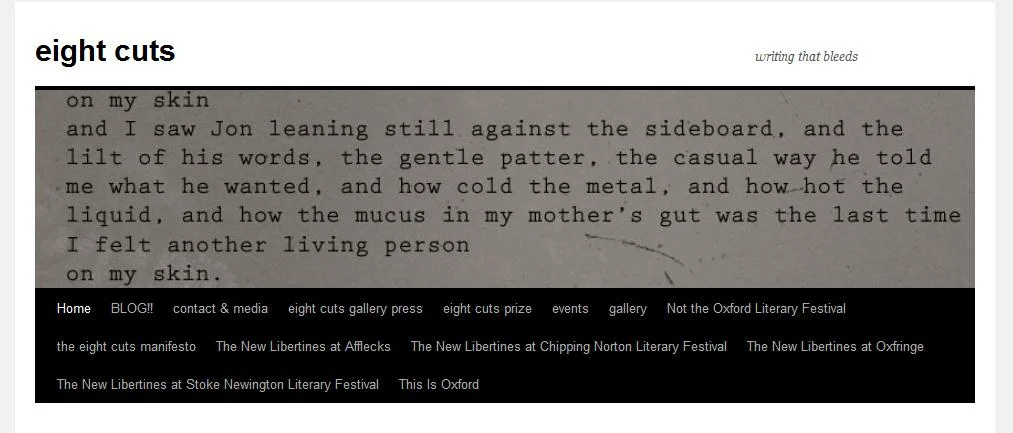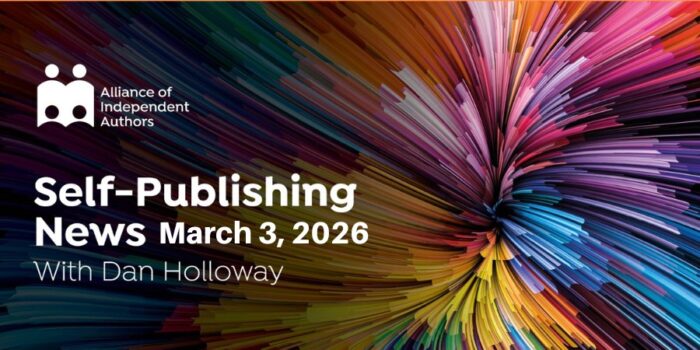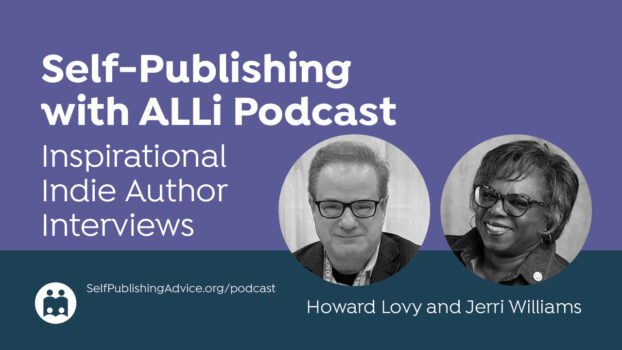Steena Holmes recently wrote a post for this blog explaining how the great thing about being indie, for her, was having the freedom to have it both ways: to self-publish or trade publish, as it suits her. Here Dan Holloway explains why the step into trade publishing is one he won't be taking — ever.
We are increasingly hearing about the hybrid model, with authors deciding for which books and in what ways to engage publishers and/or agents, who then become partners, singing to the author’s tune.
Whilst I have to say a part of me wonders if there aren’t some elements of utopianism creeping in, it is certainly true that many agents and publishers are starting to change the way they view their relationships with authors. And I certainly think what writers are doing, taking the reins – or at least setting out to – in these relationships, is fabulous, and definitely in the indie spirit.
And when it comes to decisions like Amanda Hocking’s to take the leap into publishing so as to ring-fence creative time. Well, who could fail to see that as a positive step?
It’s just not the step for me.
The key point for me lies in Steena’s tack-change half way through her compelling piece, predicated on that conditional, “if you want a writing career”.
Decision to Self-Publish
My decision to self-publish was based largely on the fact I didn’t want a writing career. I would positively hate having a writing career. As I have said many times, I am very lucky. I have a day job. It’s a menial clerical job, and it doesn’t really pay the bills – there’s no way my wife and I will ever be able to afford to own a home, and on the wrong side of the cusp of our 40s we are still mired in debt that we’re not clearing. But for the time being we have food and shelter and I have a day job I can cope with, given my fragile mental health.
It has never really crossed my mind that I could make a living as a writer. I know that to do so I would have to write the kind of thing that just doesn’t come naturally to me. Not that I don’t love the kind of genre fiction that sells by the tens of thousands. I’m a crime junkie. (Hey, I've even been on Mastermind with the Hannibal Lecter novels as my specialist subject).
And I’ve written a thriller. One that’s sold thousands of copies and has been a staff pick of the year at one of the UK’s most famous bookshops.
But writing it was like having my teeth pulled. And trying to write the sequel was like trying to conjure new teeth from the raw, bleeding pits where those teeth once were — and pulling them again.
I can’t do it.
I don’t enjoy it
And I’m not particularly good at it.
In other words, to make a career at writing I would have to turn it into a day job. And I won’t do that. Next to my wife, my cats, and my rats, writing is my great joy in life, and I want to keep it that way.
Not that I’m not ambitious. I’m hugely ambitious. I want to leave my mark on the cultural landscape for generations to come. I want to change lives, to change societies even, with my words.
I want to change the way people think about words themselves.
I won’t, of course. I’m not good enough. But it is my ambition. And the key thing is: whilst I’m not good enough to make a career writing thrillers, trying to do it gives me no pleasure. But whilst I’m not good enough to change literature, the attempt is a delight.
I Write Experimental, Sentimental Fiction
And that’s the long and short of why I could never see myself either 1. getting or 2. taking a publishing deal. I write experimental, sentimental fiction of dubious lengths and usually with a ludicrously large number of points of view. And I write performance poetry which I perform at gigs — and neither is the kind of thing that’s going to attract a mass audience.
But it’s what I love.
Self-publishing gives me the freedom to do what I love and to push at any boundary I want with no considerations other than the writing. With nothing to pull me back, nothing to pull me to the centre of the bell curve. Which isn’t to say I don’t love collaborating. I’ve worked not just with amazing artists on cover design, but with incredibly skilled artisans, and I’ve been involved in amazing multimedia arts creations. But the people I work with are also people who operate outside the mainstream.
I think there is a tendency for large sections of the media, and many writers, to mistake a lack of concern for sales with both a lack of seriousness and a lack of ambition. It’s summed up in the reaction I used to see on a major writers’ site. If you said you wanted to make a fortune, people would applaud and encourage. If you said you wanted to win the Nobel Literature Prize, the reaction was “How dare you be so arrogant?” To me that’s just deeply wrong.
I am very, very serious about my writing, and incredibly ambitious. And if my writing isn’t good enough to achieve those ambitions, I would happily settle for being literature’s Jay Jopling.
But there’s no place in those plans for a publisher.





[…] Why Indie (For Me) Means NOT Having A Publisher […]
This piece of writing presents clear idea in favor of the new visitors of blogging, that really how to
do running a blog.
Do you mind if I quote a couple of your posts as long as I provide credit and sources
back to your website? My blog is in the exact same area of interest as yours and my users
would really benefit from a lot of the information you present here.
Please let me know if this alright with you. Thanks!
Hi Nancy, we’re glad you enjoy our blog and find it helpful. We’d be very happy for you to quote small extracts, e.g. a sentence or two, followed by a hotlink back to the original post here, but please do not copy whole articles, as the copyright belongs to the authors and should not be reproduced. I’m sure that once your readers are directed here they will find other articles of interest also. Thanks very much for asking! Best wishes, Debbie Young, ALLi Blog Editor
How I did love this post, and identify with Dan, and all the others who believe themselves to be writers because they ( and not the ‘market…the publisher…the salesrep…) knew what they wrote for…the deepest expression of their need to validate their individual ‘take’ on whatever subject they wrote about. Hazardous? Certainly. It may resonate with nobody, but only by doing it can one find that out.
I have just finished an on line video course that simply assumed trad publishing is the only sensible way to go, and anything else is a failure( and could be ‘fixed’ by writing a different book) By following the steps in ‘how to write a good book proposal’ I realised two things 1) My book offered more than I thought and 2) I was certain it would never be considered ‘publishable’ or ‘agent-able’. The reviews range from ‘brilliant erudite, deserving of the widest readership’ to ‘weighty, pretentious, obscure’ but almost nothing in between. It is a litmus paper of a book, acid or alkali, no neutrals at all, and what is increasingly clear is that this is a reflection of the readers’ expectations and little to do with the book, it either meets them or it fails to and the opinions are about expectations. How does an author tailor any work to expectations and retain any validity, or any of what sparked the impulse to write it?
I too am a writer because i cannot stop, but the hope of finding readers gets more and more remote, and learning to shout louder seems to be universal advice. I cannot help feeling that when a conductor wants an orchestra to really take notice his gestures diminish in both amplitude and emphasis…whispering gets more attention. Could this find an application for writers?
“I cannot help feeling that when a conductor wants an orchestra to really take notice his gestures diminish in both amplitude and emphasis…whispering gets more attention. Could this find an application for writers?”
Almost certainly. I think what conductors have is presence, they are still and centred and that draws the eyes towards them.~That kind of “shout quietly” charisma and confidence is something that must be able to translate somehow. Thank you for such a throught-provoking question
Thanks for sharing your point of view, Dan. I also have no plans (at least foreseeable plans) for joining up with a publisher — not yet. However, I do intend to make a career of my writing, and I am well on my way there. A year after self-publishing my first novel, it is consistently earning me enough money to quit my day job (I haven’t yet because I want to get rid of my debts and have a healthy savings account before I do…but I’m 11 months away from Quitting Day.) I am not saying this to brag on my success (my success is quite modest compared to many other indie authors out there) but rather to share another perspective on the “Publishers are not part of the plan” feeling you shared here.
I tried for three years, with two different literary agents, to sell my books to publishers, large and small. None of them sold. I was told repeatedly that my ideas weren’t commercial enough, that readers didn’t want what I am writing. I finally self-published and found out how wrong those publishers were. Readers do want what I’m writing, and my guess is that readers probably want what a lot of other writers are writing, who had similar difficulties getting noticed by “the gatekeepers.”
During my struggle to get published, I heard again and again that my writing was excellent, but if I’d only write a YA novel — those were selling! Or if I’d only put a happy ending in this book — then it could be a romance, and romances were selling! Like you, the mere thought of writing to somebody else’s specs just for the sake of a contract felt like torture. So I didn’t do it, and kept throwing my good books at the industry only to have them rejected for the same old reasons. Self-publishing was a major eye-opener for me. I have a whole different approach to the industry as a whole now, even as a reader/consumer. It changed my life in more ways than just providing me with the writing career I’ve wanted since the age of eight.
I do intend to change society with my words. And I am certain that I can get there by self-publishing. The times they are a-changing, as Bob Dylan famously mumbled. I am grateful and excited to be living and writing during a time of such important, inspiring change.
That’s fabulous. I can only imagine how great it must feel to be able to quit the day job in favour of something you really love doing. I hope the time between now and then – and far into the futire – gets better and better 🙂
Thanks for this post! It strikes a chord with me, because I am in a similar boat. I don’t intend to change the world, but I do intend to carve out a safe place for a type of fiction I can’t find anymore (or maybe never could find). My writing is very niche, and it will never be popular. My hope is to reach the oddballs like me. Until the self-publishing boom came along, my only choices were to remain unpublished or try to write something else. I tried something else. I couldn’t make it past a few paragraphs. I write what I write, and self-publishing allows me to share it and hopefully recoup my expense.
Jodi
“I tried something else. I couldn’t make it past a few paragraphs.”
That sounds very familiar! Life’s too short! Here’s to reaching fellow oddballs
[…] of concern for sales with both a lack of seriousness and a lack of ambition.Link to the rest at How to Successfully Self-PublishClick to Tweet/Email/Share This Post wpa2a.script_load(); Self-Publishing Strategies2 Comments to […]
This is an interesting approach, as I’m walking both sides. I wouldn’t consider changing from self-publishing to conventional publishing for my German books. I want to be able to deliberately break certain rules of writing in certain places throughout my stories. I don’t want to spend hours on marketing – I’m happy with entertaining the readers I have.
I’ve learned to work with an editor, though – as English is not my native language, I can’t publish without a little help here and there. I like working with an editor, there are my mistakes with this language – but it also means that I must play by the publisher’s rules. Rules I’m not always happy with, even if I understand the reason and the need for some standardization. So, from my point of view, you’re doing right.
[Thanks to Roz for tweeting!]
Yes, I think there can be real pressure if you’re looking for a publisher to break the rules only in “acceptable” ways, which means you lose out on so much potential for experimentation. That said, there was a really good piece about rule-breaking just this week on Emma Darwin’s blog – http://emmadarwin.typepad.com/thisitchofwriting/2012/10/keep-bend-break-and-nonsense.html
Dan, I’ve read your work, and it was funny enough to make me laugh out loud, moving enough to bring tears to my eyes, startling enough to make me recoil, engaging enough to make me turn the page. So I’m not sure what you mean by “not good enough,” but I’m pretty sure it’s bullshit.
That’s very kind 🙂 I thik there’s only really single figure people each year one could claim to be doing something genuinely monumental though, at least half of whom won’t stand the test of time, so it’s very very very unlikely I’d be in that group! And thriller-wise, well, I absolutely know I can’t do that!
I also don’t want my hobby to become ‘a chore’ – although I’d love it to generate a fully independent income (which I currently supplement by helping other authors self-publish) I find the concept of going to a publisher or agent now would limit my range of potential to be creative, and I wouldn’t want a publisher’s marketable idea of who I am dictating my interaction with the rest of the world – or demanding that I do any marketing of my own whatsoever! 🙂
yes, exactly
I am a new Indie author/publisher w/questions about marketing. I have your same ambitions to write therefore I am. However, I want the money more than you do.
I am older and also work full time. Is there a simpler way to get noticed by readers than blogs? Do you have a favorite way to produce sales and social media conversions you are willing to share?
Freedom of expression is so important for a writer. I’ve self published five books and had two books published – each route has their pros and cons but I have yet to meet a publisher who can turn a project around in two weeks
http://www.tomevans.co/2012/10/03/how-to-write-and-publish-a-book-in-two-weeks/
The exception, of course, being when a celeb dies – when they can turn a book around in two hours, it seems!
Good point Deb – perhaps they have a load half written like obits though !!